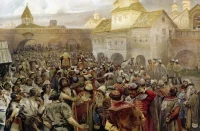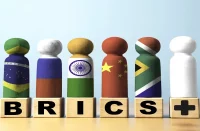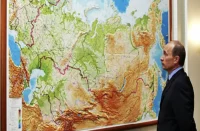No day is more important to the people of the Russian Federation and most other former Soviet republics than Victory Day, annually commemorated on 9 May. This day marks the victory of the Soviet Union over Nazi Germany and the final liberation of Europe from the fascist scourge. The Allies were many, but it was the Soviet Union and her people that bore the greatest brunt of the war. Nearly 27 million people, both soldiers and civilians, lost their lives from the beginning of Operation Barbarossa on 22 June, 1941 until Victory Day on 9 May, 1945. The Second World War had an unmistakable impact on Russian identity, the effects of which are still witnessed today in the nation’s contemporary foreign policy.
Victory Day is an event mixed between somberness and celebration. Because the Second World War affected every individual in the Soviet Union to some extent or another, the occasion has a solemn veil cast over it. It is a time to commemorate all of those who sacrificed or who underwent the ultimate sacrifice in order to defeat the greatest evil the world has ever known. This is perfectly epitomized by a new tradition that has recently surfaced in Russia, the Immortal Regiment. The descendants of Soviet servicemen march through the streets holding pictures of their forefathers who fought for their country’s freedom. Throughout this special day, woman give flowers to the veterans they encounter, and families carry around photo albums of their relatives who fought in the Great Patriotic War.
![Victory Day [May 9] 2014. Nevsky Avenue, St.Petersburg, Russia. People demonstrating photos of their relatives who perished during the defense of the Northern capital in 1941-1944.](https://orientalreview.su/wp-content/uploads/2014/05/10303871_669068056487114_4458737648398666522_n.jpg)
Victory Day and the entire World War II experience has thus become one of the defining moments of Russian civilization. Although the war was much more brief than the Tatar Yoke, the difference in years was more than made up for by the difference in sheer brutality and the rapidity of large-scale destruction and genocide. In this manner, Victory Day is something that is eternal to all members of Russian civilization, and its lessons live on to serve as a guide for the Russian state today.
The scale of suffering encountered during the war forever scarred the mentality of the Soviet and Russian people and has thus made them extremely averse to war. They know more than anyone else the horrors and ravages that war can bring to one’s homeland, and they therefore prefer peace to any type of conflict. This helps to explain why Russia is always opposed to the US and NATO’s campaigns of conquest and its all too reminiscent “Drang nach Osten”. Nonetheless, if war does come, the Russian people have proven their resolve to handle it and turn the tide, no matter how vicious and savage the enemy. This is a history lesson that the Ukrainian fascists would do well not to forget when dealing with the peaceful protesters in the eastern part of their country.
This brings to mind Russia’s strong belief in human equality. Being on the receiving end of the Nazi’s racist policies which viewed Slavs as subhuman, Russians understand how degrading and dangerous such a status can be to a person. It is for this reason that Russia is against the “grotesque Russophobia” of the Ukrainian junta and the racial discriminatory policies of the Baltic states. Moscow is adamantly opposed to these racial policies of social and political segregation and it stands in complete disagreement with the glorification of Nazism in either of those areas. After the millions of lives lost because of such a hateful and wicked ideology, it is unquestionable why the resurgence of Nazism on Russia’s borders would disturb and sicken the country’s citizens (as it should any sane individual in the world).
Moscow showed the world on 9 May, 1945 that it has the will to succeed in defending those who are under oppression and to liberate them from their suffering. In the same vein, this tradition is still alive today, as witnessed by recent events in Georgia and Ukraine. In both situations, Russia felt an innate urge to humanitarily intervene to protect its citizens (i.e. Abkhazia, South Ossetia) or its compatriots (Crimea). The case is more complicated and less clear cut in Eastern Ukraine than in the two antecedent situations owing to a different historical history and the mixed demographics (ethnic, legal) there. Be that as it may, Russia has been using its international prestige and influence to extend extensive diplomatic support for the pro-federalization activists in Eastern Ukraine, and it is certain that if the tangible threat of genocide emerges, then Russia would certainly intervene to responsibly protect the population.
It has been seen that Victory Day is a spiritual, eternal celebration that pays homage to the unfathomable human cost of the Soviet population during World War II. This massive sacrifice forever altered the identity of Russia and its political psyche, and the reverberations are easily seen in the country’s overall foreign policy today. Russia works to preserve peace and stabilization all across the world, with its diplomatic initiatives in Syria and Ukraine most recently demonstrating this commitment. It is against any type of discrimination against minorities, and it is especially sensitive to the inglorious mistreatment of ethnic Russians and Russian speakers in the Baltics and Ukraine. Should situations spiral out of control and intervention is forced upon the country, Russia does not hesitate to act and humanely protect those who need it. Although Winston Churchill may be somewhat forgiven for describing Russia as “a riddle, wrapped in a mystery, inside an enigma” before World War II, for all outside (mostly Western) observers that bemoan the country’s foreign policy ‘unpredictability’ after that tragedy, they simply are not paying enough attention to the foreign policy legacy that Victory Day reminds the world of yearly.















Pingback: Kırım Tatarları : Sürgünün 70. Yıldönümü! | YERELCE
Pingback: Rusija, Zapad i dvije obljetnice: Mogu li postojati dva antifašizma ili je samo jedan nacifašizam i samo jedan antifašizam? » SBPeriskop